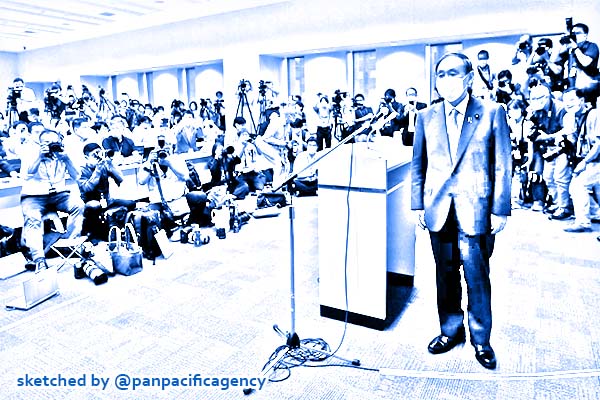Japan’s PM candidate Yoshihide Suga says he’ll continue Abenomics reforms

Chief Cabinet Secretary Yoshihide Suga attends a news conference to announce his candidacy for the Liberal-Democratic Party leadership election, in Tokyo, on Wednesday. Photo: REUTERS/Issei Kato. Sketched by the Pan Pacific Agency.
TOKYO, Sep 2, 2020, Reuters. Japanese Chief Cabinet Secretary Yoshihide Suga declared on Wednesday he will run for the leadership of the ruling party, a race he is heavily favored to win, which would likely ensure the veteran politician will become the next prime minister, Japan Today reported.
Suga, a longtime aide to outgoing Prime Minister Shinzo Abe, said he would not stop the Abenomics reforms of outgoing premier.
Suga said he was entering the race to avoid a political vacuum at a time of crisis.
“I decided to run in the LDP leadership race after some deep thought on what I can do as a politician and a member of Abe’s administration,” Suga said.
The party’s leader is set to take over as prime minister given the LDP’s majority in the lower house of parliament.
Abe announced his decision to resign last week, citing poor health.
Suga’s main competitors in the Sept 14 party vote are a former defense minister, Shigeru Ishiba, and ex-foreign minister Fumio Kishida, but Suga’s position looks strong.
He has secured the backing of five of the LDP’s seven factions, public broadcaster NHK and others reported.
The party decided on Tuesday to hold a slimmed-down election with just members of parliament and three votes from each of the 47 prefectures – an advantage for Suga.
Many party chapters will poll rank-and-file members to decide how to allocate their three votes, but experts say this is unlikely to change the momentum growing for Suga if the members of the five factions back him.
Financial markets also favor Suga, assuming he will continue with the reflationary Abenomics strategy aimed at reviving the economy.
But Ishiba is by far the most popular candidate among the public and has been on a media blitz over the past few days, raising questions about the possibility of change after Abe’s eight years at the helm.
“During Abenomics, stocks rose, the yen was weak and wrought unprecedented profits to companies – that’s something to be grateful for,” Ishiba said on Fuji TV on Wednesday when asked how he would improve the lives of low-income workers and the unemployed.
“But what do we do with the dark side of that? That’s the most important question in the post-Abe era,” he said.
Apart from inheriting an economy in the throes of its worst downturn since World War Two, Abe’s successor will have to try to ensure that next year’s Olympics – already delayed for a year by the novel coronavirus – go ahead as planned.
In recent months, Abe had seen his support fall to one of the lowest levels since taking power in December 2012 because of growing discontent among voters with his handling of the coronavirus and scandals among LDP members.